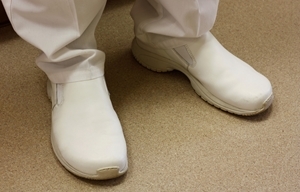While your feet may be the last thing you're thinking of while working travel nursing jobs, you might want to start making them a priority. When shopping for the right pair of scrubs, take some time to find the proper shoes to wear while at work. But before you head out for a day of shopping, take these tips into consideration:
Does comfort mean healthy?
Some shoes you may see other RNs wearing may look fashionable and they might even tell you that they feel rather comfortable, but that doesn't mean the soles are providing the proper support for their feet. According to the Washington Post, those who suffer from osteoarthritis in the knee may want to stay away from clogs and other shoes that are believed to provide stability. In fact, the American College of Rheumatology conducted a small study on the topic.
In 2010, professionals from Rush Medical College collected data from 31 participants who underwent radiographic and symptomatic knee osteoarthritis gait analysis with an optoelectronic camera. Information was collected both with the patients were walking barefoot and while wearing different types of shoes: clogs, flat walking shoes, stability shoes and flip flops. Since a travel nurse will never wear flip flops to work, we can disregard that information.
However, it is worth noting that both clogs and stability shoes resulted in a greater amount of peak knee adduction moment when compared to walking barefoot and in flat walking shoes. This indicates that this variation of shoes may not be the best for a travel nursing professional who is suffering from osteoarthritis in one or both knees. In fact, the best bet may be just a standard pair of walking shoes. These are different than running types you may purchase from a fitness store.
Advice for proper foot care
While finding the right pair of shoes can go a long way in foot care for healthcare professionals who spend most of the day on their feet, there are other steps you can take to keep your dogs from barking. Some of the most common types of foot problems include dry skin, calluses, corns, warts, bunions, ingrown toenails and hammertoe, to name a few. While each of these conditions may require different treatment options, here are some steps you can take toward prevention:
- Check your feet regularly for any cuts or blisters that could get infected or lead to other foot health issues.
- Keep circulation in your feet consistent when sitting by putting your feet up, other ways to improve blood flow include walking and stretching.
- Never put your shoes and socks on when your feet are wet; instead, dry them off with a towel first.
- Unless you're walking on the beach, it's best to wear shoes at all times when you are outside.
While special care and attention may be needed for the feet of travel nursing professionals and other medical workers, it's important that everyone keep their foot health in mind. So, be sure to share these tips with patients you are treating, especially if they suffer from diabetes.

